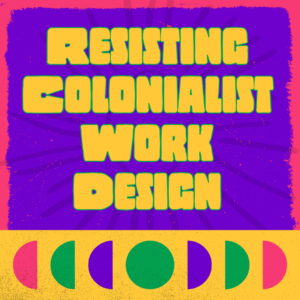In the pursuit of justice and equity, marginalized communities must confront and resist the colonialist design aesthetic that perpetuates the exploitation of working people. Beyond simply advocating for “time off,” it is imperative for individuals from these communities to redefine and reshape the very fabric of work schedules. Introducing concepts such as crip-time, self-pacing, play, and rest into the formal work structure is the path to true freedom.
Ways to Resist Colonialist Work Design
Colonialist work designs often prioritize productivity at the expense of the well-being of workers, especially those from marginalized backgrounds. In response, the adoption of crip-time becomes an act of reclaiming agency over one’s time and energy. Crip-time, rooted in disability justice, recognizes and accommodates the varied and unpredictable pace at which individuals may navigate their tasks. This approach challenges the rigid time constraints imposed by colonialist structures and embraces the understanding that productivity is not a one-size-fits-all concept.
Self-pacing emerges as a powerful tool in dismantling the colonialist notion of a standardized and relentless work pace. By empowering individuals to set their own rhythms and timelines, self-pacing acknowledges the diversity of experiences and abilities within marginalized communities. It creates a space where individuals can thrive at their own pace, fostering a work environment that values both the unique contributions of each person and the collective well-being of the community.
Play and rest are integral components of a holistic approach to work-life balance. Resisting the colonialist deign aesthetic involves incorporating moments of joy, creativity, and relaxation into the daily routine. By recognizing the importance of play, individuals can rejuvenate their spirits, enhance their creativity, and contribute to a healthier, more sustainable work culture.
Flexibility in planning outcomes and timetables is essential for success beyond short-term gains. Instead of adhering to rigid structures that prioritize immediate results, marginalized communities must adopt a long-term perspective. Success is not merely about individual achievements but about the collective progress and well-being of the entire community. Flexible planning allows for adaptation to changing circumstances, fostering resilience and sustainability over time.
How do we define success in this liberated design?
True success in dismantling colonialist work designs requires comprehensive compensation for everyone involved. This includes not only fair wages but also recognition of diverse contributions, skills, and experiences. Collaboration is at the heart of this endeavor, with the understanding that a collective effort is needed to create a future where everyone is empowered and fully compensated for their work.
The resistance against the colonialist deign aesthetic of working people to exhaustion demands a paradigm shift. By embracing crip-time, self-pacing, play, and rest, marginalized communities can forge a path towards a more just and equitable work culture. Success is redefined as a long-term, collective endeavor that prioritizes the well-being and liberation of all individuals involved.

